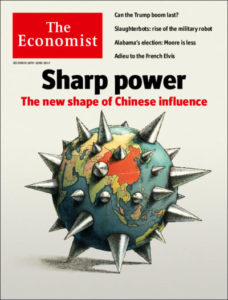
National Endowment for Democracy (NED)
China is facing an uphill struggle to project its sharp power in Central and Eastern Europe after Czech voters last month elected a new resolutely pro-Western president, Petr Pavel. The retired senior NATO general takes office in March but has already infuriated Beijing by talking with the president of Taiwan and telling The Financial Times that China “is not a friendly country” and “is not compatible with Western democracies in their strategic goals and principles,” The New York Times reports:
For Chinese companies, political uncertainty in foreign democracies has often meant headaches…..Philippe Le Corre, a researcher at the Asia Society Policy Institute, said that democratic churn and generational change in countries that China previously looked to as friendly had disrupted once reliable support in Europe’s formerly communist eastern fringe. “China, in my view, has lost Eastern Europe,” Mr. Le Corre said, adding that the Ukraine war had accelerated a decoupling of interests between Beijing and many Eastern and Central European countries.
Martin Hala, a China expert at Prague’s Charles University, said: “People in this region were very starry-eyed about China. Now it is very, very different.” The decoupling of Chinese and local interests began with the realization that Chinese investment was “not just free money falling from the sky,” said Hala, a contributor to the National Endowment for Democracy’s Sharp Power project.
 Hála explains how, despite Beijing’s strong-arm tactics, democracies in East Central Europe have blunted the impact of sharp-power manipulations by investigating and exposing them, in a recent set of essays for the Journal of Democracy, which explores how societies in three world regions are “Combating Beijing’s Sharp Power”: John Fitzgerald details how civil society in Australia and Chinese Australians were the first to push back against Chinese interference in Australian politics and public life; Ketty Chen writes that Taiwan has long been the biggest target of Beijing’s information manipulation, and Taiwanese civil society has pioneered methods for defending against it.
Hála explains how, despite Beijing’s strong-arm tactics, democracies in East Central Europe have blunted the impact of sharp-power manipulations by investigating and exposing them, in a recent set of essays for the Journal of Democracy, which explores how societies in three world regions are “Combating Beijing’s Sharp Power”: John Fitzgerald details how civil society in Australia and Chinese Australians were the first to push back against Chinese interference in Australian politics and public life; Ketty Chen writes that Taiwan has long been the biggest target of Beijing’s information manipulation, and Taiwanese civil society has pioneered methods for defending against it.







